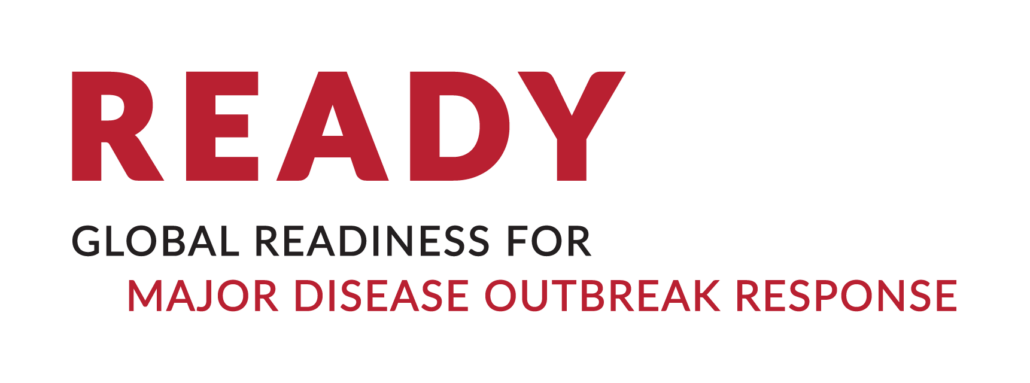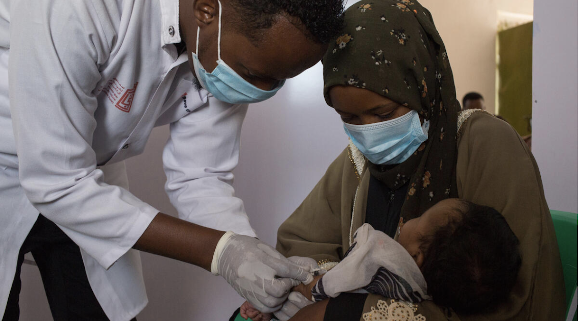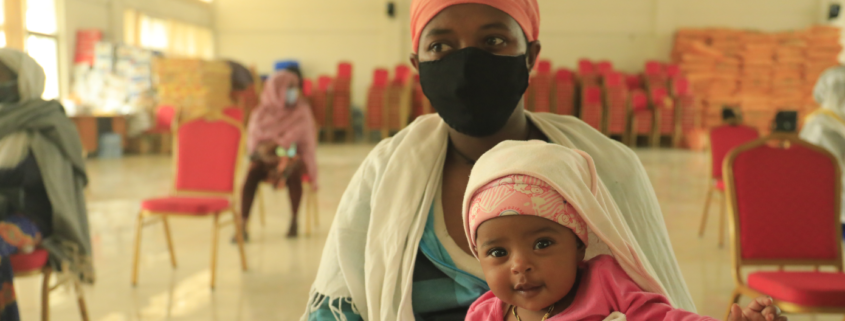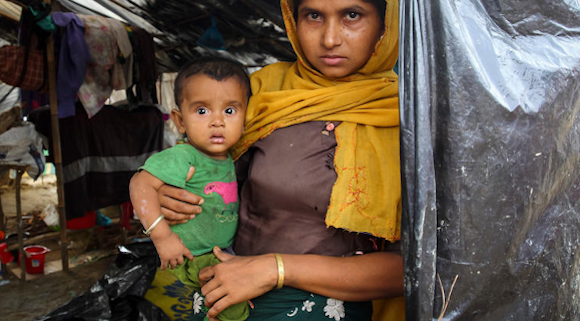O READY publica atualizações aqui: notícias, anúncios e outras atualizações sobre a iniciativa.
Será que a vacina contra a COVID-19 chegará algum dia às populações deslocadas à força?
Palestrantes: Prof. Heidi Larson, LSHTM; Colette Selman, Gavi; Dra. Morseda Chowdhury, BRAC; Dra. Ayoade Olatunbosun-Alakija, ex-coordenadora humanitária chefe, Nigéria; Dra. Joanne Liu, Universidade de Montreal e ex-presidente internacional da MSF
Esforços estão em andamento para acelerar o desenvolvimento e a distribuição de uma vacina contra a COVID-19, com ênfase até agora em destacar a equidade na distribuição entre os países. Embora a COVID-19 tenha um impacto desproporcionalmente maior em certas populações, incluindo populações deslocadas à força, muitas vezes é politicamente insustentável dizer que esse grupo deve ter prioridade quando se trata de planejar campanhas de vacinação.
Estudos de soroprevalência mostram imunidade abaixo do ideal a várias doenças preveníveis por vacinas entre refugiados, e menor cobertura de vacinação desses grupos em comparação com populações locais anfitriãs também foi observada. Além disso, há barreiras específicas — informais (idioma, acesso à informação e cultura) e econômicas e administrativas que os impedem de acessar espontaneamente as campanhas de imunização. O que isso significa para a vacina contra a COVID-19 chegar às populações deslocadas à força? Como o acesso pode ser garantido? Quais são as questões éticas? Como a logística será tratada em cenários humanitários? Junte-se à Professora Heidi Larson e aos painelistas selecionados enquanto eles discutem essa questão crítica e controversa.
MODERADOR: Professora Heidi Larson, Professora de Antropologia, Risco e Ciência da Decisão, London School of Hygiene and Tropical Medicine | Heidi Larson é antropóloga e Diretora do The Vaccine Confidence Project (VCP); Professora de Antropologia, Risco e Ciência da Decisão, LSHTM; Professora Clínica, Departamento de Saúde Global, Universidade de Washington, Seattle, EUA, e Professora Convidada na Universidade de Antuérpia, Bélgica. A Dra. Larson chefiou anteriormente a Comunicação Global de Imunização na UNICEF, presidiu a Força-Tarefa de Advocacia da GAVI e atuou no Grupo de Trabalho SAGE da OMS sobre hesitação em relação às vacinas. Seu interesse particular em pesquisa é sobre gerenciamento de risco e rumores, desde os ensaios clínicos até a entrega – e construção de confiança pública. Ela é autora de Stuck: How vaccine rumores start and why they don't go away (OUP 2020).
PAINELISTAS
- Colete Selman, Chefe regional de suporte ao país, Gavi, the Vaccine Alliance: Colette tem mais de 15 anos de experiência em saúde pública e desenvolvimento, incluindo na Gavi, GFATM, Comissão Europeia, ONGs e setor privado, com foco em cenários frágeis e de conflito.
- Dr. Morseda Chowdhury, Diretora Associada, Programa de Saúde, Nutrição e População, BRAC: Morseda Chowdhury trabalha no BRAC há mais de 15 anos e lidera sua resposta de saúde pública à pandemia de COVID-19, inclusive com populações Rohingya deslocadas à força.
- Ayoade Olatunbosun-Alakija, Ex-coordenadora-chefe humanitária, Nigéria: A Dra. Olatunbosun-Alakija é uma autoridade mundialmente reconhecida em fazer a ponte entre a ação humanitária e o desenvolvimento humano sustentável. Como coordenadora-chefe humanitária da Nigéria, no comando do Emergency Coordination Centre, ela atuou como interlocutora de alto nível entre atores estatais e não estatais em níveis governamentais e intergovernamentais.
- Dra. Joanne Liu, Professora Clínica Associada, Universidade de Montreal; ex-presidente internacional da Médicos sem Fronteiras: Joanne Liu é uma voz de destaque em crises humanitárias médicas e atuou como presidente internacional da Médicos sem Fronteiras (MSF) de 2013 a 2019. Ela continua atuando como médica, tanto em campo com a MSF quanto em turnos hospitalares em Montreal.
Saúde Materna, Neonatal e Reprodutiva em Emergências (MNRHiE) e COVID-19: Sucessos, Desafios e Próximos Passos
Quarta-feira, 2 de dezembro de 2020 | 08h00-09h00 Washington/13h00-14h00 Londres | Painelistas: Alice Janvrin, consultora independente; Ashley Wolfington, consultora de saúde global; Shehu Nanfwang Dasigit, IRC Serra Leoa; Donatella Massai, consultora técnica líder, READY
Assine as atualizações do READY para receber anúncios de futuros webinars | Visualizar/baixar o relatório da consulta especializada discutido neste webinar
Os impactos na saúde, na economia e na sociedade COVID 19 são sentidos em todo o mundo e mais criticamente por aqueles em risco de exposição, formas graves de doença, mortalidade e aqueles que enfrentam o peso da crise econômica. A comunidade global continua a temer a despriorização dos programas MNRHiE durante COVID 19 preparação e resposta, e há o risco de que as desigualdades existentes nos serviços de MNRHiE sejam exacerbadas se não agirmos agora.
Em outubro de 2020, a iniciativa READY financiada pelo Bureau of Humanitarian Assistance (BHA) e o Inter Agency Working Group sobre saúde reprodutiva em crises (IAWG) lideraram uma consulta especializada reunindo as principais partes interessadas em MNRH e doenças infecciosas para compartilhar e compilar experiências e lições aprendidas da primeira fase da resposta. Este webinar apresentará as descobertas dessas consultas, incluindo:
- Adaptações bem-sucedidas e desafios dos programas MNRHiE durante COVID 19;
- Sucessos, desafios e lacunas atualmente disponíveis COVID 19 ferramentas e diretrizes;
- A interação entre os níveis global e de implementação, relacionada à programação do MNRHiE;
- Recomendações para apoiar os serviços e intervenientes do MNRHiE para melhorar o acesso e a qualidade dos cuidados às populações vulneráveis em futuras vagas de COVID 19 e em surtos futuros.
PAINELISTAS
Alice Janvrin, Consultora Independente
Alice tem dez anos de experiência internacional, com sete anos criando e executando programas de saúde e saúde reprodutiva em contextos humanitários complexos, incluindo a República Centro-Africana, Chade, Nigéria e República Democrática do Congo. Como Coordenadora de Saúde Reprodutiva do International Rescue Committee, ela pilotou um modelo de programa integrado de SRH e GBV na Nigéria e liderou vários projetos de pesquisa e avaliação, incluindo uma avaliação do impacto do Ebola na Saúde Sexual e Reprodutiva na RDC. Alice recebeu seu BSc em Psicologia pela Royal Holloway (University of London) e seu Msc em Saúde Internacional pela University of Copenhagen.
Ashley Wolfington, consultora de saúde global
Ashley tem 15 anos de experiência em saúde pública e comunicação, com especialização em saúde sexual e reprodutiva e HIV, e programas e políticas humanitárias e de desenvolvimento. Ela liderou a equipe de Saúde Sexual e Reprodutiva do Comitê Internacional de Resgate por cinco anos, liderando uma equipe de especialistas em saúde pública para fornecer assistência técnica a programas em 26 países afetados por crises, incluindo preparação e resposta a emergências. Ela agora está trabalhando com a IPPF, supervisionando o desenvolvimento e a entrega de seu programa humanitário global. Ela tem graduação em Ciência Política e Francês pela Duke University e mestrado em Saúde Pública pela Colombia University.
Shehu Nanfwang Dasigit, Especialista Regional em Saúde Pública, IRC Serra Leoa
Por mais de 11 anos, Shehu N. Dasigit tem se envolvido ativamente em respostas clínicas e de saúde pública entre populações vulneráveis local e internacionalmente como um profissional de saúde pública em saúde reprodutiva, materna, neonatal, infantil e adolescente (RMNCAH). Ele participou da implementação do projeto PEPFAR com a Faith Alive Foundation e o PMTCT Center Jos, Nigéria como enfermeiro de ART/peri-op, supervisionando a configuração e o gerenciamento do centro cirúrgico. Ele também atuou como enfermeiro clínico na American University of Nigeria (AUN), Yola, e apoiou em treinamentos e conscientização sobre saúde da comunidade da AUN. Shehu é atualmente o especialista regional em saúde pública do IRC Sierra Leone, fornecendo suporte técnico aos projetos de fortalecimento do sistema de saúde (HSS) RMNCAH. Como enfermeiro registrado e parteira, Shehu recebeu um bacharelado em ciências de enfermagem na University of Jos, Nigéria, e um mestrado em saúde pública na Cavendish University Uganda.
Donatella Massai, Consultora Técnica Líder, READY
Nos últimos vinte anos, Donatella tem se envolvido em programas internacionais de resposta a desastres em todo o mundo, com foco especial em Saúde de Emergência. Ela participou de atividades como a reativação da Força-Tarefa Global para o controle da Cólera, preparação para o ZIKA e resposta regional na América do Sul e Central para UNICEF, como Diretor de País e Coordenador Médico da Médicos Sem Fronteiras, e Diretor Geral de Organizações Internacionais como Greenpeace, Anistia Internacional e a Fundação Robert F. Kennedy na Itália. Com UNICEF, Donatella foi a líder de Saúde de Emergência para o surto de cólera no Haiti e oficial de saúde de emergência para a região da África Ocidental e Central. Ela conduziu vários projetos de pesquisa e avaliação em epidemias, incluindo a revisão pós-ação para a Unidade de Tratamento de Ebola da Save the Children em Serra Leoa. Donatella recebeu seu mestrado na Faculdade de Medicina, especialização em gestão de sistemas de saúde pela Universidade La Sapienza em Roma e seu mestrado em Política Internacional com especialização em Direitos Humanos na Paris XI-Faculté Jean Monnet, Droit-Economie.
Registre-se para este webinar | Assine as atualizações do READY para receber anúncios de futuros webinars | Uma gravação estará disponível nesta página após o webinar.




